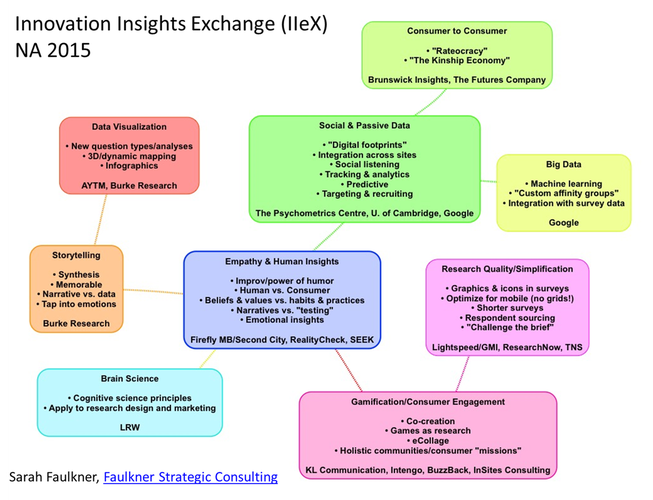|
IIeX (Innovation Insight Exchange) is an annual market research event to exchange innovative methods, approaches and ideas for consumer and market insights. I attended this year's NA IIeX event in Atlanta last month and wanted to share some of what I learned. The mind map below captures some of the key themes I experienced during the event with more details on my three biggest insights below.  1. Empathy & Human Insights: it's no coincidence that this theme appears in the center of the map above--it was not only woven throughout the conference, but human insights are also the starting place for all innovation. It would be easy to write "empathy" off as a buzzword or flavor of the month, but to me, it's just the logical evolution of customer-centricity. How can you design a great product or service for someone without understanding what's important to them and what they value? The idea of "human insights" recognizes that each of us is more than buyer, more than a user, and frankly, probably doesn't spend nearly as much time thinking about your category as you wish. It's about relating to another person as just that, a person--and by understanding their lives more completely, it can lead to more compelling messaging, more delightful products and services, and a brand connection that endures. Driving the point home, Jim Chastain from RealityCheck Consulting commented, "Brands create more growth and loyalty when they solve 'life tensions' vs. 'category issues'." 2. Data Visualization & Storytelling: let's face it, the way we communicate insights has to change, is changing, and will continue to change. The neuroscience on storytelling is well-documented: if you want something to stick, tell a story; if you want to provoke action, tell a story. I think we're honestly all still figuring this out when it comes to consumer research, but let's start in simple ways--instead of a "consumer profile" with bullet points of data in a report, let's give voice to a specific person and tell a narrative of his/her life and how our products support or enable him/her. Burke Research suggested selecting from a range of creative reporting approaches, including: apps, quizzes, magazines, newsletters, videos, storyboards and even live shows. We may not all be graphic designers (exhibit A: my mindmap above) or professional authors or have a degree in anthropology, but we can all think differently about designing research and presenting results using visual thinking and stories. Again, simple examples--instead of asking why someone likes a certain kind of cookie, ask them for their favorite memories that involve the cookie; or, instead of slide after slide of data tables (that's what appendices are for!), how can we weave the most critical information into an at-a-glance infographic that becomes an invaluable reference for the future. I'm not saying it's easy, but it is a skill that must be developed. Check out "The Back of the Napkin" by Dan Roam for some great tips on visual thinking. 3. The Marriage of Big and "Little" Data: talk about a buzzword--my eyes seriously start to glaze over when I see "big data" in a headline these days, but what I am interested in is the synergy between so-called big data and other, more traditional sources of consumer research, like survey tools. At IIeX, Google talked about the concept of machine learning and how they use survey data to "train" their algorithms and the Psychometric Centre at the University of Cambridge showed that "digital footprints" (e.g. what you "like" on Facebook) can more accurately predict personality than humans! I've been interested in using unstructured/social data as a source for consumer insight for a while now, but some of these presentations were incredible. Off the bat, there seem to be obvious applications for extremely targeted recruiting for research via social media/search and I'm sure Google Consumer Surveys will offer even more integration in the future between their big data and respondent survey results on the back end. It's a very cool new frontier in the arena of behavioral research to be sure!
0 Comments
Leave a Reply. |
AuthorSarah Faulkner, Owner Faulkner Insights Archives
July 2021
Categories
All
|

 RSS Feed
RSS Feed
